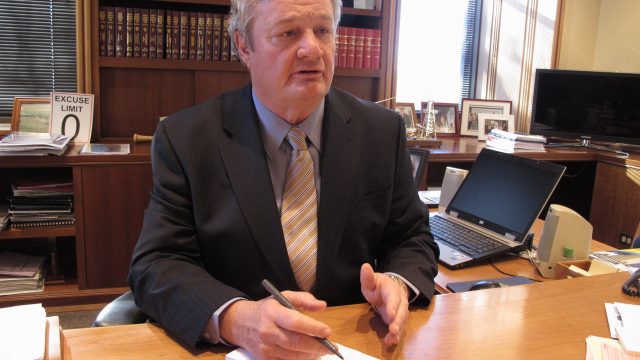Governor Jack Dalrymple Gives Non Answer When Asked About Refugee Concerns

Some governors are growing increasingly concerned about foreign refugees the federal government is placing in their states through resettlement programs run by nonprofits (like Lutheran Social Services here in North Dakota).
The feds have announced plans to increase the number of refugees America takes in per year from 70,000 to 100,000 by 2017.
In Maine, Governor Paul LePage is concerned about the impact of refugees on local budgets. “It’s a fiscal issue,” Peter Steele, a spokesman for LePage, told Fox News. “You can only pay for what you can afford, and those funds should be going to the most needy citizens in our state.”
Georgia Governor Nathan Deal has requested that the federal government keep the number of refugees his state takes in at 2,500. The City of Amarillo, Texas, has actually gotten the number of refugees they’re taking in cut back as local officials deal with issues like taking 911 calls in 36 different languages.
But states can opt out of refugee resettlements, per a 1980 law, but that’s hard given that the groups which run these programs are something less than cooperative with local governments when it comes to what they’re doing. There is some question as to whether or not refugee resettlements would actually halt if local officials requested it.
According to a 1980 law, states can opt out of the program and need to be consulted in the process. However, Don Barnett, a fellow with the Center for Immigration Studies, describes refugee resettlement as a “secretive” and lucrative business for “non-profits” who operate with little coordination with state and local communities.
“In every encounter I’ve had with resettlement representatives, they will say if the locality doesn’t want it, we won’t resettle them — but this hasn’t been tested,” Barnett said.
This brings us to North Dakota, where there has been angst over refugee resettlements for years now. More so lately as anecdotes about refugees committing crimes and relying too heavily on social programs circulate. And when anyone is critical of the resettlements, or even asks for some crime/social program statistics to quantify the impact of these refugees on our communities, they’re derided as racists or xenophobes.
So what does Governor Jack Dalrymple think of all of this? I asked Dalrymple spokesman Jeff Zent if the governor has any concerns about security or the fiscal impacts of resettlement. I also asked if Dalrymple has had any communication with the federal government about resettlements, and if he had any plans for policies or announcements concerning the resettlements in the future. What I got back was sort of a non answer.
“Generally speaking, our position is that North Dakota has always been an open and welcoming state to those from other areas of world who seek opportunity and a better life,” Zent told me in an email. “At the same time, we want to be sure that our communities are prepared and equipped to handle the needs that come with resettlement.”
I’m not sure what to take from that, other than that Zent kind of didn’t want to answer the questions so gave me some fluff instead.
It’s a sticky political issue, to be sure. Again, the reaction from supporters of these resettlements has been furious whenever questions about security or fiscal impacts have been raised, and perhaps Dalrymple doesn’t see the need to go sticking his foot in this particular mud puddle.
That said, it might help ease concerns about resettlements if North Dakota residents could get some real answers about the impacts of resettlements, and Dalrymple is in the perfect position to help push some of those details out into the light.
As I’ve said before, I’m not against resettlements. But I am against the federal government and nonprofits like LSS refusing to be transparent about resettlements and dismissing perfectly valid local concerns. People who support the resettlements should feel that way too, because the status quo is doing more harm to their cause than good.




